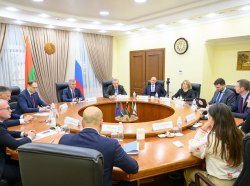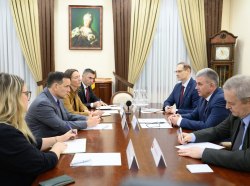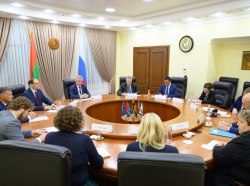Tiraspol - Chisinau, January 30. /Novosti Pridnestrovya/. It is hard to understand the logic of the actions of the Parliament of Moldova in the history of the "law on separatism". The final adoption of this law will be a bomb of direct action, that will undermine the negotiation process between Tiraspol and Chisinau. This opinion was expressed by Vitaly Ignatiev, the Minister of Foreign Affairs of the PMR.
“Against the background of the necessity to maintain contacts with Pridnestrovie, as international participants [5+2 format] say about it, and against the background of the fact that everyone agrees with the idea of continuing the negotiation process, it does not matter, officially or unofficially, the Moldovan side seems to be trying to make the last attempt to run out from the negotiating table. To push over the table with the help of such bills,” the head of the Ministry of Foreign Affairs noted.
According to him, it is clear that the "law on separatism" is directed "against the dialogue, it is anti-Pridnestrovian and politicized."
Recall that the Parliament of Moldova plans to adopt this bill in the final reading this week. We are talking about amendments that introduce new articles into the Criminal Code of the Republic of Moldova - in particular, “Conspiracy against Moldova” (from 2 to 7 years in prison) and “Separatism”. Also, in the Criminal Code of the Republic of Moldova, such concepts as “anticonstitutional subject” and “illegal information structure” are defined. In the latter case, we are talking about a structure that will collect information “constituting a state secret” or “other information that may harm Moldova” (the content of the second concept is not disclosed). Creating an "illegal information structure" is punishable by 7 to 10 years in prison.
Calls for "separatism" are expected punishment from 2 to 5 years in prison. For "incitement" - a fine of 35 to 75 thousand lei, calls for "separatism" with the use of violence - from 7 to 12 years in prison. For financing "separatism" - from 6 to 12 years in prison or a fine from 600 to 750 thousand lei.
Back in December, when the bill had just appeared, the legal experts noted its potential danger, first of all for Pridnestrovie. The events of the past week have shown that these assumptions were correct. First, the representative of the SIS at the hearings in the Moldovan parliament directly stated that the "law on separatism" would affect the structures of the Government and the Supreme Council of the PMR. Then, the ex-head of Moldovan military intelligence, Yuri Brichag, proposed to start 20-30 new criminal cases against representatives of the Pridnestrovian authorities, after which, as he believes, the PMR "will crumble down like a house of cards."
It should be noted that there were more than two hundred criminal cases against Pridnestrovian by the year 2019: officials, entrepreneurs, and ordinary citizens. The subject of politically motivated criminal cases has become one of the issues of the negotiation process between the PMR and the RM.
Back in 2017, the President of Pridnestrovie, Vadim Krasnoselsky, as a gesture of goodwill, proposed to cease 10 criminal cases from each side. Pridnestrovie closed 10 cases against Moldovan citizens. From Chisinau, there was no response.








